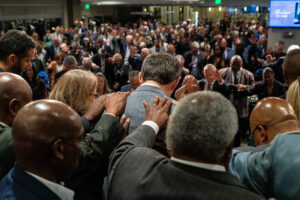
WASHINGTON (BP)–Sen. John McCain’s recent global warming speech assured Americans of one thing, a skeptical scientist says -– no major presidential candidate in 2008 will challenge prevailing assumptions.
The May 12 address by the presumptive Republican Party nominee “made it clear that there will be no presidential candidate this year willing to question the assertion that [climate change] is manmade, or the assertion that we can fix global warming by passing a few laws,” wrote Roy Spencer, a research scientist at the University of Alabama-Huntsville and an evangelical Christian, in a commentary for National Review Online.
The scientific evidence for human-induced global warming is questionable, and the ability to do anything about it could seriously harm economic growth, he said.
“So, here we are with bad science ready to support bad policy decisions that will lead to bad economic times ahead, and no presidential candidate who is willing to ask the hard questions,” Spencer wrote.
In his speech, McCain proposed a “cap-and-trade system” that would set a limit on carbon dioxide and other greenhouse gas emissions and permit a trading system among companies, enabling those that produce more emissions to purchase credits from those that produce fewer.
The Democratic candidates –- Sens. Barack Obama of Illinois and Hillary Clinton of New York –- have offered similar plans, but they charged McCain’s proposal is too timid, The New York Times reported. Obama and Clinton’s plans call for a decrease in emissions of 80 percent from 1990 levels by 2050, according to The Times. McCain, meanwhile, proposed a cut of at least 60 percent during the same time period.
The Evangelical Climate Initiative (ECI) applauded McCain’s comments. Although ECI has called for an 80 percent emissions reduction by 2050, spokesman Jim Ball said the group was “greatly encouraged by the principles and proposals” offered by McCain. In a written statement, Ball commended the speech’s “moral high road.”
“We also laud the concern for the most vulnerable people, for in the development of policy we must reflect the Creator God’s heart for the poor, protecting the most defenseless of our citizens and those who suffer the worst when the conditions” are the worst, Ball said.
The Cornwall Alliance for the Stewardship of Creation, which provides a counterpoint to ECI among evangelicals, offered a mixed response to McCain’s speech.
“I think that there [were] some good things in Senator McCain’s speech and some things with which I would disagree,” said Calvin Beisner, Cornwall’s national spokesman, who prefaced his remarks by saying the alliance seeks not to comment directly on candidates or legislation.
“I’m not excited about cap-and-trade,” Beisner told reporters at a May 15 news conference in Washington. “[T]he pursuit of more efficient technologies for the use of energy seems to be a far more effective way of reducing emissions than command-and-control structures.
“But I do think Senator McCain was correct when he said the United States has to take leadership on this issue. And, in fact, it has been taking leadership on this issue.”
Though it refused to ratify the international Kyoto Protocol after its approval in 1997, the United States led other countries in reducing greenhouse gas emissions, Beisner said. The Kyoto agreement required the reduction of such emissions.
“We did better than the countries that signed the Kyoto accord,” he said. “We took the initiative. We took the lead. And we did it primarily by pushing not command-and-control, centrally organized solutions but by pushing for the development of technologies that allow us to use energy more efficiently.”
Beisner agreed with McCain’s call for the use of nuclear power. McCain said nuclear energy “is a powerful ally” in reducing global warming.
Nuclear technology is extremely safe and competitive economically, Beisner said. “Evangelicals, even if we disagree over the question of man-made, catastrophic global warming, can agree that there is one thing that makes sense regardless which position you take on that issue,” he said of the use of nuclear energy.
Like ECI, Cornwall also expresses concern for the poor in espousing its opposition to the current approach to global warming. Cornwall asserts the science is unclear on the cause of such climate change. It also is concerned that some proposals based on the prevailing beliefs on global warming will drive up energy prices and have especially negative effects on the poor.
Spencer also is a spokesman for Cornwall.
The Southern Baptist Ethics & Religious Liberty Commission is a partner in a new campaign led by Cornwall. The “We Get It!” campaign is an effort to gain the endorsements of a million evangelical Christians to a brief document that espouses biblical responsibility for the environment and the poor.
In his speech, McCain said he would work with other countries to hold China and India accountable. Those two countries “have the potential to pollute the air faster, and in greater annual volume, than any nation ever in history,” he said, according to his prepared remarks. He will apply the same standards to industries in China and India that are applied to American companies, McCain said.
–30–
Compiled by Tom Strode, Washington bureau chief of Baptist Press.
















